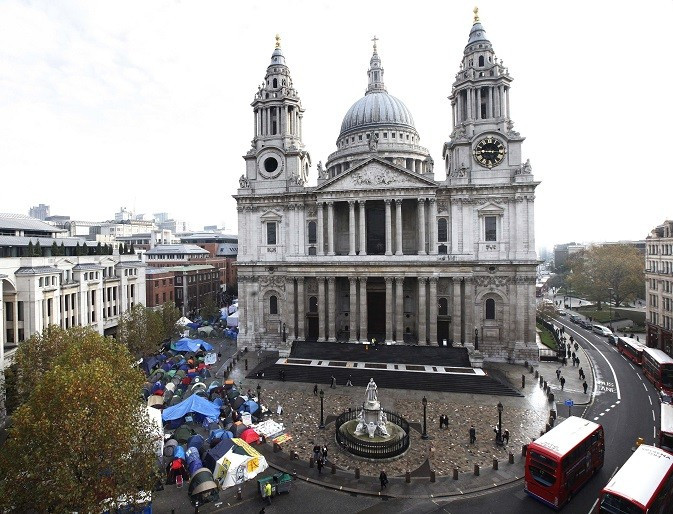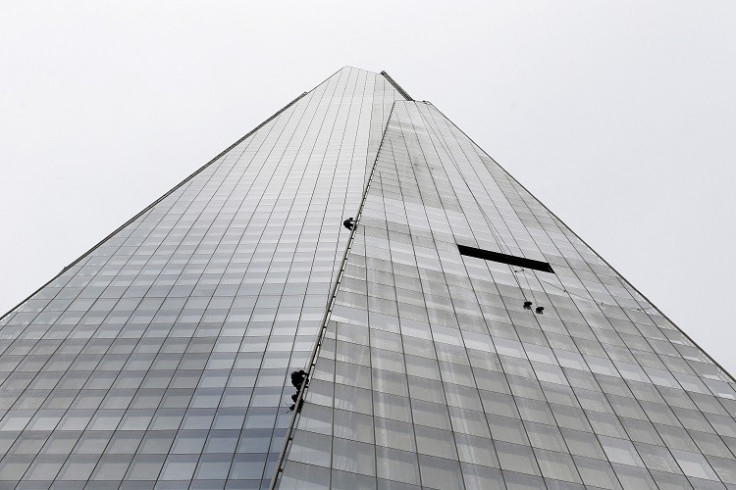Occupy London: Can Greenpeace-Style Direct Action Revive Dying Movement?

The front of St Paul's Cathedral is empty now, save a few squabbling pigeons and awe-inspired tourists gawping up at the great white church.
Two years ago was different, when a shanty village of tents smothered the floor. In between the ramshackle dwellings, lined with right-on slogans and flags, was an excitable, rag-tag rabble of protesters.
Some were young, some were old. There were protest veterans and wide-eyed newborns to the world of revolution.
It was the birth of Occupy London, the British child of the global Occupy movement that had started on Wall Street, New York, the throbbing brain of financial capitalism.
Occupy was fuelled by a sense of injustice. It burst aflame from the cold shadows of banks' crumbling skyscrapers, burning on anger at the financial crisis and those who caused it.
This was it, the world was told. This was the catalyst to change, an organic revolutionary spring flowing from the 99% against the 1% who dominate economic and political power. It was going to succeed where there ill-fated 1968ers failed.
No more would we pay the price for their crisis. No more would we stay silent as governments kow-towed to their corporate masters. No more would money matter more than people.
That was 2011. It is 2013 now. The same banks still dominate the financial markets and most turn a tasty profit. The UK government is still at the whim of slithering corporate lobbyists. We're all still grinding on, paycheque to paycheque, our salaries worth less as our bills spiral.
And the protestors are long-gone from St Paul's, evicted by the courts and police with, it is alleged, some collusion from the church itself.
'Very Little Resistance' to Austerity
At the beginning of a small 13 October gathering on the future of Occupy London, a defibrillator session of sorts, one activist who is giving a presentation repeats a joke she'd heard at an event in Amsterdam.
Occupy is trying to mobilise the 99% mass against the 1% elite, she said. What is instead happening is 1% fighting another 1% as an indifferent 98% stands to one side.
When you look movement's many manifestations, a slew of different campaigns and spin-offs since its inception, the silent but deadly club of mass indifference dispatched them all to the same fate.
To name some of the most well-known carcasses: Break up the Banks, Occupy Economics, Strike Debt UK, City Reform Group, Occupy Faith, Bank of Ideas, and the School of Ideas.
All are either dead or suspiciously quiet for something that's supposed to be alive. None meaningfully grabbed the public's attention other than for a brief moment at the start of whichever new scheme had been dreamt up.
These days, Occupy London's events page has become little more than a conduit for alerts to all sorts of campaigns and meetings, with subjects as diverse as the war in Syria, fracking in West Sussex, and "radical anthropology".
Likewise the relevant hashtags on Twitter - social media having played an important role in Occupy's engagement and recruitment - are fading focal points for discussion on a number of issues.
Still, though, some are trying to reignite the movement and make it more than just a flash-in-the-pan gimmick, something to lift the creaking bones of ageing revolutionaries in a post-Berlin Wall world.
During the future of Occupy session, one well-spoken activist still involved in the shrunken movement laments lost chances.
"When we met at St Paul's two years ago, austerity was in the offing and we were all opposed to the implications of that," he said.
"I think there was a feeling among people that, as it all kicked in, things would get much worse and there would be a mass movement rising opposing it.
"Unfortunately, two years into it now, austerity is well under way and that mass movement hasn't really materialised. There has been very little resistance from within the population and even the protest movement of Occupy has diminished to an extent."
He thought there may have been a couple of "poll tax moments" to catalyse again the groundswell seen on 15 October, 2011, such as the so-called 'Bedroom Tax', but there were no sparks.
There were however a couple of "tactical victories", he said, where Occupy London had lent some weight behind campaigns to save local hospitals and libraries.
However, protest had largely been ineffective in the movement's purported wider goals and "pretty much a waste of time. They don't work."

Now is the time for direct action, he adds, as exemplified by the Greenpeace protestors who recently scaled the Shard and the camp at Balcombe which saw exploratory drilling for shale gas halted for several days.
But is it all too late?
UK Recovery?
There are tentative signs of a dawning economic recovery. Output growth is picking up, as is the labour market. Incomes are still in decline, with price inflation outpacing weak pay rises, but these are also expected to recover over the coming year.
If this really is the start of a sustained recovery, it makes Occupy London's challenge even harder.
Having failed to maintain its momentum while the situation was at its worst, when the case Occupy makes was most potent, how can it possibly keep growing if the economy heals?
"We would all be delighted if it really did and could feel able to go home and concentrate on more fun things. But as the median real income has been falling for over a decade in the UK and since the 70's in the US the question is 'whose economy?'" says one nameless Occupy London activist over email.
"The vast percentage of any growth goes to the top few % (notably the top 0.0016% - 1000 rich list - whose average wealth has risen from £270m to £450m in the last four years according to Murdoch's press).
"In the US the 20 'too big to fail banks' at the start of the crisis have amalgamated to five. As the parasites continue to eat one another and suck too much blood from the 99% we are, unfortunately, rather confident about our long term growth prospects."
The Future
In true Occupy style, and like the many leftist collectives before them, the consensus answer appears to be more bureaucracy. More meetings, discussions, working groups.
Just a glimpse at the minutes from the meeting on Occupy London's future confirms this.
"National meetings needed. Working Groups meet and work. Good that we're all doing different things and this meeting different from a GA [General Assembly]," they read.
More talk to resolve wonkish internal quarrels on essentially trivial political disagreements, the self-defeating 'splitter' mentality that has so blighted the anti-capitalist left's ability to unite and organise effectively.
Yet there is a sense of the need for clarity and to overcome this sort of fracturing. To find a focus on which people can define and understand what Occupy London is about - and to take action.
"We're not campaigning to expand Occupy in separate actions," say the minutes.
"Occupy is still quoted in academia and the media. To show the world we're still here we need a campaign group, but as a direct action group."
A hint at things to come, perhaps, assuming Occupy can once again get the numbers needed to repeat such attention-grabbing and forceful direct action as building a makeshift village in the City of London and refusing to budge for months.
"Be more like Greenpeace - campaigning model," say the minutes. "It is capitalism stupid - need to focus."
© Copyright IBTimes 2025. All rights reserved.






















